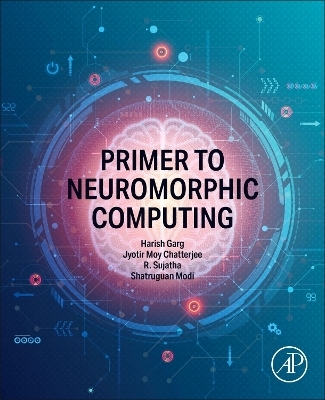
Primer to Neuromorphic Computing
Academic Press Inc (Verlag)
978-0-443-21480-6 (ISBN)
Dr. Garg is Associate Professor of Mathematics at Thapar Institute of Engineering and Technology, Patiala, Punjab, India. He is the recipient of the Obada-Prize 2022 – Young Distinguished Researchers. He is also the recipient of the Top-Cited paper by an India-based author (2015 – 2019) from Elsevier Publisher. He also serves as an advisory board member of the Universal Scientific Education and Research Network (USERN). Dr. Garg's research interests include computational intelligence, multi-criteria decision making, evolutionary algorithms, reliability analysis, expert systems, and decision support systems, computing with words, and soft computing. He has authored more than 400 papers published in refereed international journals. He has also authored seven book chapters. He has also edited 8 books from Elsevier, Springer, and other publishers. Dr. Garg also serves on editorial boards of several leading international journals, this includes the Founding Editor-in-Chief of the Journal of Computational and Cognitive Engineering. He is also the Associate Editor of IEEE Transaction of Fuzzy Systems, Soft Computing, Alexandria Engineering Journal, Journal of Intelligent & Fuzzy Systems, Complex and Intelligent Systems, Journal of Industrial & Management Optimization, and CAAI Transactions on Intelligence Technology. He is currently working as an Assistant Professor in CSE at Graphic Era (Deemed to be University), Dehradun, India, and also as a Visiting Faculty in IT at Lord Buddha Education Foundation, affiliated with the Asia Pacific University of Technology & Innovation, Malaysia, in Kathmandu, Nepal. Previously, he served as an Assistant Professor and Program Leader for the B.Sc. IT program at Lord Buddha Education Foundation, and as an Assistant Professor in the CSE department at GD-Rungta College of Engineering & Technology, affiliated with Chhattisgarh Swami Vivekananda Technical University in Bhilai, India. He completed an M. Tech degree in Computer Science & Engineering from Kalinga Institute of Industrial Technology in Bhubaneswar, Odisha in 2016, and a B. Tech degree in Computer Science & Engineering from Dr. MGR Educational & Research Institute in Maduravoyal, Chennai in 2013. Machine Learning and Deep Learning are the person's research interests, specifically in the fields of advancements in these areas. Dr. R. Sujatha received the B.E. degree in computer science from Madras University, in 2001, the M.E. degree in computer science from Anna University, in 2009, with university ninth rank, the master’s degree in financial management from Pondicherry University, in 2005, and the Ph.D. degree in data mining from the Vellore Institute of Technology (VIT), Vellore, in 2017. She has 15 years of teaching experience and has been serving as an Associate Professor with the School of Information Technology and Engineering, VIT. She has organized and attended several workshops and faculty development programs. She actively involves herself in the growth of the institute by contributing to various committees at both academic and administrative levels. She gives technical talks in colleges for the symposium and various sessions. She acts as an advisory, editorial member, and technical committee member in conferences conducted in other educational institutions and in-house too. She has published a book Software Project Management for college students. Also, she has published research articles and papers in reputed journals. She used to guide projects for undergraduate and postgraduate students and currently guides doctoral students. She is interested in learning upcoming things and gets herself acquainted with the student’s level. Her areas of research interests include data mining, machine learning, software engineering, soft computing, big data, deep learning, and blockchain. Dr. Shatrughan Modi is an Assistant Professor at Department of Computer Science, Indian Institute of Information Technology Una, India. Prior to that he worked at a Computer Science and Engineering Department of Thapar University, Patiala. He has more than 9 years of teaching experience and 2 years of industry experience. Her areas of research interests include data mining, neural network, pattern recognition, Autonomous vehicles, software engineering, machine learning, deep learning.
1. Neuromorphic Computing for Machine Learning: An Overview
2. Designing of GAN for real time image processing in neurocomputing
3. Review of Existing Neuromorphic Systems
4. Neuromorphic System for Cardiovascular Disorders
5. Neuromorphic System for Real-time Healthcare Applications
6. Neuromorphic Systems for Smart home Devices
7. Neuromorphic systems for real-time image processing
8. Real time Visual Data Processing using Neuromorphic Systems
9. Future Prospective of Neuromorphic Computing in Artificial Intelligence: A Review, Methods and Challenges
10. Neuromorphic Systems for Smart home Devices
11. Neuroscience-inspired - Facial Mask Recognition using MobileNet and Computer Vision in real-time video streaming
12. A Neuro-Inspired Journey: Tracing the Evolution and Objectives of Neuromorphic Systems
13. Deploying Shark Smell Optimization algorithm with Neuromorphic computing principles for prediction of COVID-19 disease
| Erscheinungsdatum | 30.11.2024 |
|---|---|
| Verlagsort | San Diego |
| Sprache | englisch |
| Maße | 152 x 229 mm |
| Gewicht | 450 g |
| Themenwelt | Informatik ► Theorie / Studium ► Künstliche Intelligenz / Robotik |
| ISBN-10 | 0-443-21480-8 / 0443214808 |
| ISBN-13 | 978-0-443-21480-6 / 9780443214806 |
| Zustand | Neuware |
| Haben Sie eine Frage zum Produkt? |
aus dem Bereich


